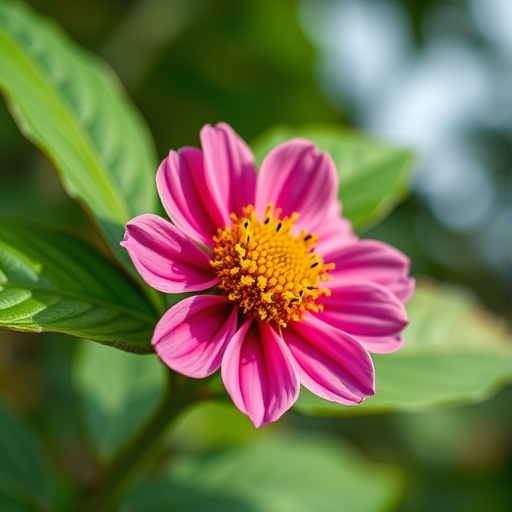In an era characterized by rapid advancement in biotechnology and pharmaceuticals, a unique perspective emerges from an unexpected intersection of traditional knowledge and scientific inquiry. The rising interest in the medicinal properties of plants has resulted in a renewed focus on the ancient wisdom that various cultures have harnessed for generations. Published in the journal Discover Sustainability, a groundbreaking paper authored by Trujillo Frede, Danquah, Friedrich, and their colleagues explores the often-overlooked relevance of medicinal plants in maintaining health and biodiversity from a social ecology standpoint. This research not only emphasizes the importance of these plants in natural ecosystems but also highlights the profound ethical and sociocultural dimensions associated with their use.
The authors assert that medicinal plants are not merely valuable for their pharmacological properties but are also integral to the cultural identity and health practices of numerous communities worldwide. Despite the huge prevalence of synthetic drugs, the exploration and preservation of traditional uses of plants remain critical. These plants serve as a lifeline for many, especially in rural settings where access to modern healthcare is limited. By delving deep into this focus area, the researchers illustrate how interconnected the health of humans is with the health of ecosystems, challenging readers to reconsider the complexities of biodiversity loss against the backdrop of medicinal plant usage.
Throughout the study, the researchers employed a comprehensive methodology, incorporating a wide-ranging literature review and field research. They engaged with local communities, gathered anecdotes, and documented the myriad ways in which medicinal plants are woven into the fabric of daily life. By emphasizing participatory methods, the paper presents an authentic perspective on how indigenous knowledge is integral to sustainable resource management and health promotion. This understanding necessitates a reconsideration of governance structures that currently prioritize industrial development over the rich knowledge systems of local populations.
Interestingly, the paper sheds light on the alarming fact that many medicinal plants are currently under threat due to habitat destruction, climate change, and unsustainable harvesting practices. The authors estimate that over 20% of known medicinal plant species are at risk of extinction, which directly jeopardizes the cultural heritage and health of the communities reliant on them. This creates a pressing need for conservation efforts and sustainable practices that not only aim to protect these vital resources but also ensure that the cultural identities tied to them continue to thrive.
In examining the relationship between global health challenges and biodiverse ecosystems, the authors argue that the preservation of medicinal plants can play a pivotal role. Each species offers unique biochemical compounds that could lead to pioneering medical treatments. Furthermore, the genetic diversity contained within these plants serves as a reservoir for future healthcare advancements. The research posits that sustainable management practices, which involve the local communities in both the stewardship and the cultural engagement with plants, can lead to improved health outcomes and biodiversity conservation.
Moreover, the authors discuss the socio-economic dimensions of medicinal plant use, emphasizing how knowledge and access can empower communities. In economically disadvantaged regions, the sale of medicinal herbs can provide income, fostering sustainable livelihoods while simultaneously encouraging the preservation of traditional ecological knowledge. The study showcases examples of successful community-led initiatives that have strengthened economic resilience through the exploitation of local biodiversity, urging policymakers to recognize and support similar models.
As the need for integrative health approaches gains momentum, the role of medicinal plants is being re-evaluated in various health agendas globally. Practices grounded in traditional knowledge are often accompanied by holistic health approaches that prioritize prevention over mere symptom management. The authors argue for a paradigm shift in healthcare strategies, advocating for the incorporation of traditional medicine within formal healthcare systems to enhance public health outcomes.
Nevertheless, this integration should not be without due respect for the cultural contexts from which these practices evolve. Ethical considerations remain paramount, especially concerning intellectual property rights and the biopiracy of indigenous knowledge. The authors call for frameworks that honor the contributions of local communities while providing them with the necessary tools to benefit from their cultural resources, thereby fostering an environment of mutual respect and collaboration.
The publication concludes with a powerful call to action. The need for greater awareness surrounding the value of medicinal plants is urgent, as is the need for interdisciplinary collaborations that bridge the gap between traditional knowledge and contemporary scientific inquiry. By engaging with social ecologists, conservationists, healthcare providers, and local communities, the study advocates for the creation of a sustainable future where health and biodiversity coalesce.
In essence, the work illuminates the invaluable contributions that traditional practices can offer in the face of modern global challenges. By prioritizing the conservation of medicinal plants and recognizing their cultural significance, there lies an opportunity to forge a more sustainable, inclusive, and health-oriented world. The narrative urges that our relationship with nature, particularly through the lens of medicinal flora, is not merely one of extraction but rather one of reciprocal care and stewardship.
As we continue to explore the vast potential that lies within nature’s pharmacy, the compelling insights offered by this important study highlight a path toward reconciling human health with the planet’s well-being. The holistic approach suggested by the authors emphasizes that the solutions to pressing health and ecological crises may very well reside in the vibrant and diverse tapestry of life that encompasses medicinal plants.
Subject of Research: The relevance of knowledge and use of medicinal plants for health and biodiversity from a perspective of Social Ecology.
Article Title: The relevance of knowledge and use of medicinal plants for health and biodiversity: a perspective from Social Ecology.
Article References:
Trujillo Frede, C., Danquah, I., Friedrich, T. et al. The relevance of knowledge and use of medicinal plants for health and biodiversity: a perspective from Social Ecology. Discov Sustain 6, 1007 (2025). https://doi.org/10.1007/s43621-025-01978-0
Image Credits: AI Generated
DOI:
Keywords: Medicinal plants, biodiversity, social ecology, health, traditional knowledge, conservation, sustainable practices, community empowerment, holistic health approaches.




